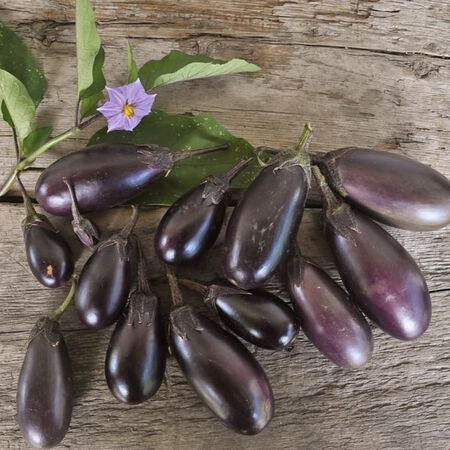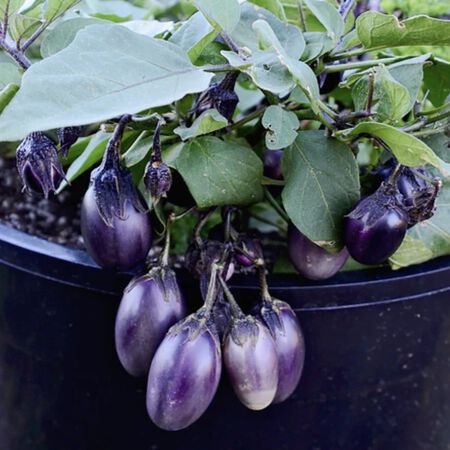Patio Baby, (F1) Eggplant Seeds
Key Attributes
Product Details
Weight
0.005Depth
0.05Height
4.5Width
3.25Plant Height
18-36"Botanical Name
Solanum melongenaSeed Type
SeedSeeds Per Gram
185Seeds Per Pound
83,000Row Spacing
3'Packet
10 SeedsSow Depth
1/8"Seeds Per Ounce
5,175Breed
F1 HybridSun
Full SunMaturity
Early SeasonLife Cycle
AnnualSow Method
TransplantPlant Spacing
18"Categories
EggplantDays To Maturity (# Days)
50Components
Growing Instructions
![]() Learning Download: How to Grow Eggplant
Learning Download: How to Grow Eggplant
In addition to the common slender, long, deep purple eggplant, there are many varieties including colors of white, orange, light purple and various shapes. Eggplant has a texture similar to squash.
Before Planting: Start eggplant seeds indoors up to 10 weeks before the last frost date. Eggplants do best in rich, well-drained soil. Mulch can help eggplants boost their growth in the spring, and adding a light-colored straw-like mulch in the summer helps reduce heat build-up.
Planting: Plant the seeds 1/4 inch deep, water after planting and cover loosely with plastic to retain moisture. Transplant the seedlings to the garden when soil temperatures reach 60 degrees. Leave up to 24 inches between plants in rows set 2 to 3 feet apart.
Watering: Water 1 to 2 inches per week.
Fertilizer: Fertilize with a complete nutrient solution to keep plants dark green and healthy.
Days to Maturity: Eggplants are ready to harvest as soon as 70 days after sowing the seeds.
Harvesting: Harvest fruit at desired size. Baby eggplant around 8 ounces and mini eggplant around 4 ounces. Harvesting eggplant frequently encourages more growth. To harvest, beware of the eggplant’s prickly stem. The fruit bruises easily, so be gentle while harvesting. Use prunes or a sharp knife to cut the fruit from the plant, but be sure to keep a short piece of stem on the fruit.
Tips: Harvestable fruits should be firm and inside seeds should not be visible once cut open. The inside flesh of the eggplant should be cream colored.
Shipping Schedule
Our Seed Promise
 "Agriculture and seeds" provide the basis upon which our lives depend. We must protect this foundation as a safe and genetically stable source for future generations. For the benefit of all farmers, gardeners and consumers who want an alternative, we pledge that we do not knowingly buy or sell genetically engineered seeds or plants.
"Agriculture and seeds" provide the basis upon which our lives depend. We must protect this foundation as a safe and genetically stable source for future generations. For the benefit of all farmers, gardeners and consumers who want an alternative, we pledge that we do not knowingly buy or sell genetically engineered seeds or plants.
The mechanical transfer of genetic material outside of natural reproductive methods and between genera, families or kingdoms, poses great biological risks as well as economic, political, and cultural threats. We feel that genetically engineered varieties have been insufficiently tested prior to public release. More research and testing is necessary to further assess the potential risks of genetically engineered seeds. Further, we wish to support agricultural progress that leads to healthier soils, to genetically diverse agricultural ecosystems, and ultimately to healthy people and communities.
To learn more about the "Safe Seed Pledge" please visit www.councilforresponsiblegenetics.org.
Key Attributes
Product Details
Weight
0.005Depth
0.05Height
4.5Width
3.25Plant Height
18-36"Botanical Name
Solanum melongenaSeed Type
SeedSeeds Per Gram
185Seeds Per Pound
83,000Row Spacing
3'Packet
10 SeedsSow Depth
1/8"Seeds Per Ounce
5,175Breed
F1 HybridSun
Full SunMaturity
Early SeasonLife Cycle
AnnualSow Method
TransplantPlant Spacing
18"Categories
EggplantDays To Maturity (# Days)
50Components
Growing Instructions
![]() Learning Download: How to Grow Eggplant
Learning Download: How to Grow Eggplant
In addition to the common slender, long, deep purple eggplant, there are many varieties including colors of white, orange, light purple and various shapes. Eggplant has a texture similar to squash.
Before Planting: Start eggplant seeds indoors up to 10 weeks before the last frost date. Eggplants do best in rich, well-drained soil. Mulch can help eggplants boost their growth in the spring, and adding a light-colored straw-like mulch in the summer helps reduce heat build-up.
Planting: Plant the seeds 1/4 inch deep, water after planting and cover loosely with plastic to retain moisture. Transplant the seedlings to the garden when soil temperatures reach 60 degrees. Leave up to 24 inches between plants in rows set 2 to 3 feet apart.
Watering: Water 1 to 2 inches per week.
Fertilizer: Fertilize with a complete nutrient solution to keep plants dark green and healthy.
Days to Maturity: Eggplants are ready to harvest as soon as 70 days after sowing the seeds.
Harvesting: Harvest fruit at desired size. Baby eggplant around 8 ounces and mini eggplant around 4 ounces. Harvesting eggplant frequently encourages more growth. To harvest, beware of the eggplant’s prickly stem. The fruit bruises easily, so be gentle while harvesting. Use prunes or a sharp knife to cut the fruit from the plant, but be sure to keep a short piece of stem on the fruit.
Tips: Harvestable fruits should be firm and inside seeds should not be visible once cut open. The inside flesh of the eggplant should be cream colored.
Shipping Schedule
Our Seed Promise
 "Agriculture and seeds" provide the basis upon which our lives depend. We must protect this foundation as a safe and genetically stable source for future generations. For the benefit of all farmers, gardeners and consumers who want an alternative, we pledge that we do not knowingly buy or sell genetically engineered seeds or plants.
"Agriculture and seeds" provide the basis upon which our lives depend. We must protect this foundation as a safe and genetically stable source for future generations. For the benefit of all farmers, gardeners and consumers who want an alternative, we pledge that we do not knowingly buy or sell genetically engineered seeds or plants.
The mechanical transfer of genetic material outside of natural reproductive methods and between genera, families or kingdoms, poses great biological risks as well as economic, political, and cultural threats. We feel that genetically engineered varieties have been insufficiently tested prior to public release. More research and testing is necessary to further assess the potential risks of genetically engineered seeds. Further, we wish to support agricultural progress that leads to healthier soils, to genetically diverse agricultural ecosystems, and ultimately to healthy people and communities.
To learn more about the "Safe Seed Pledge" please visit www.councilforresponsiblegenetics.org.




